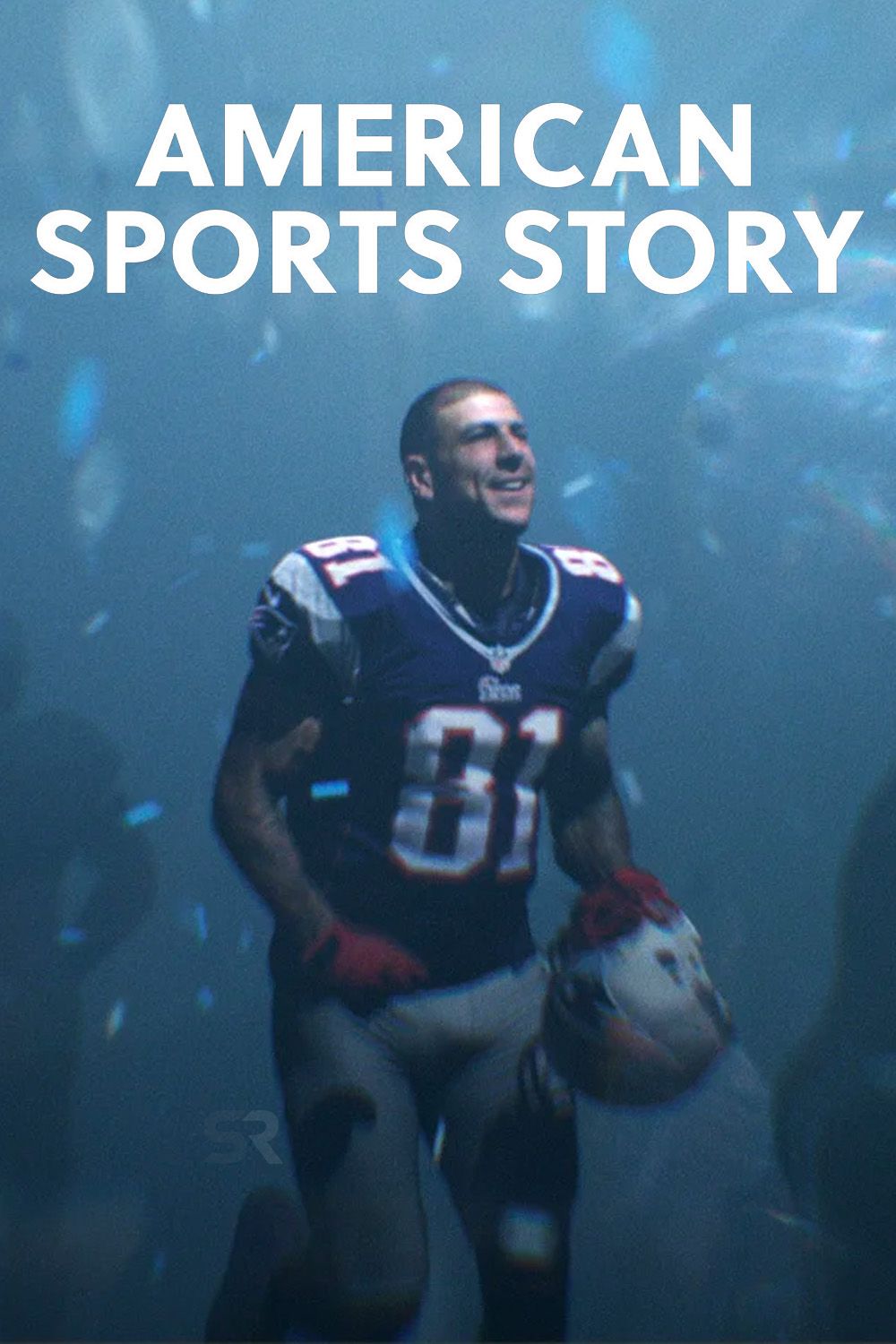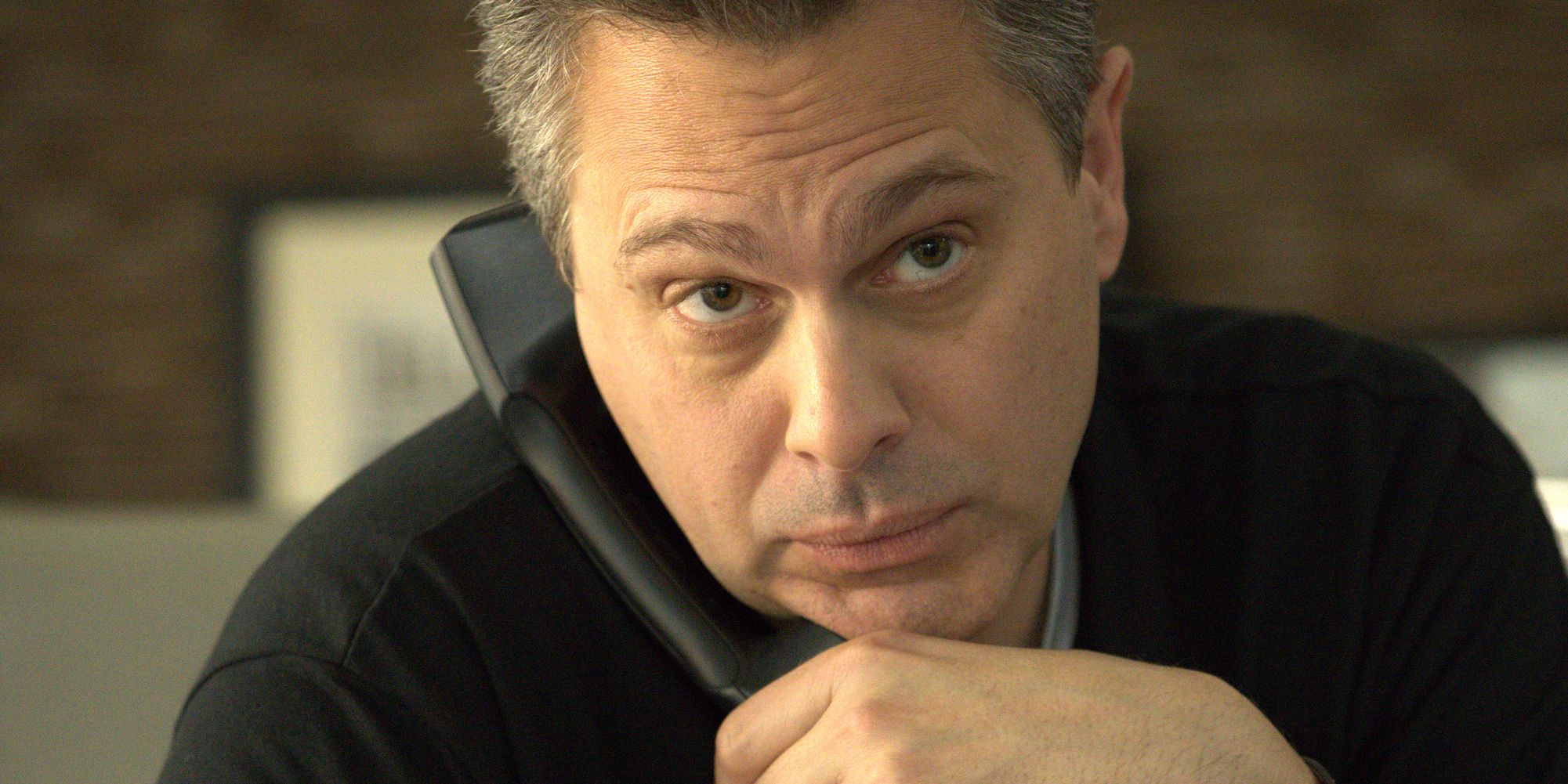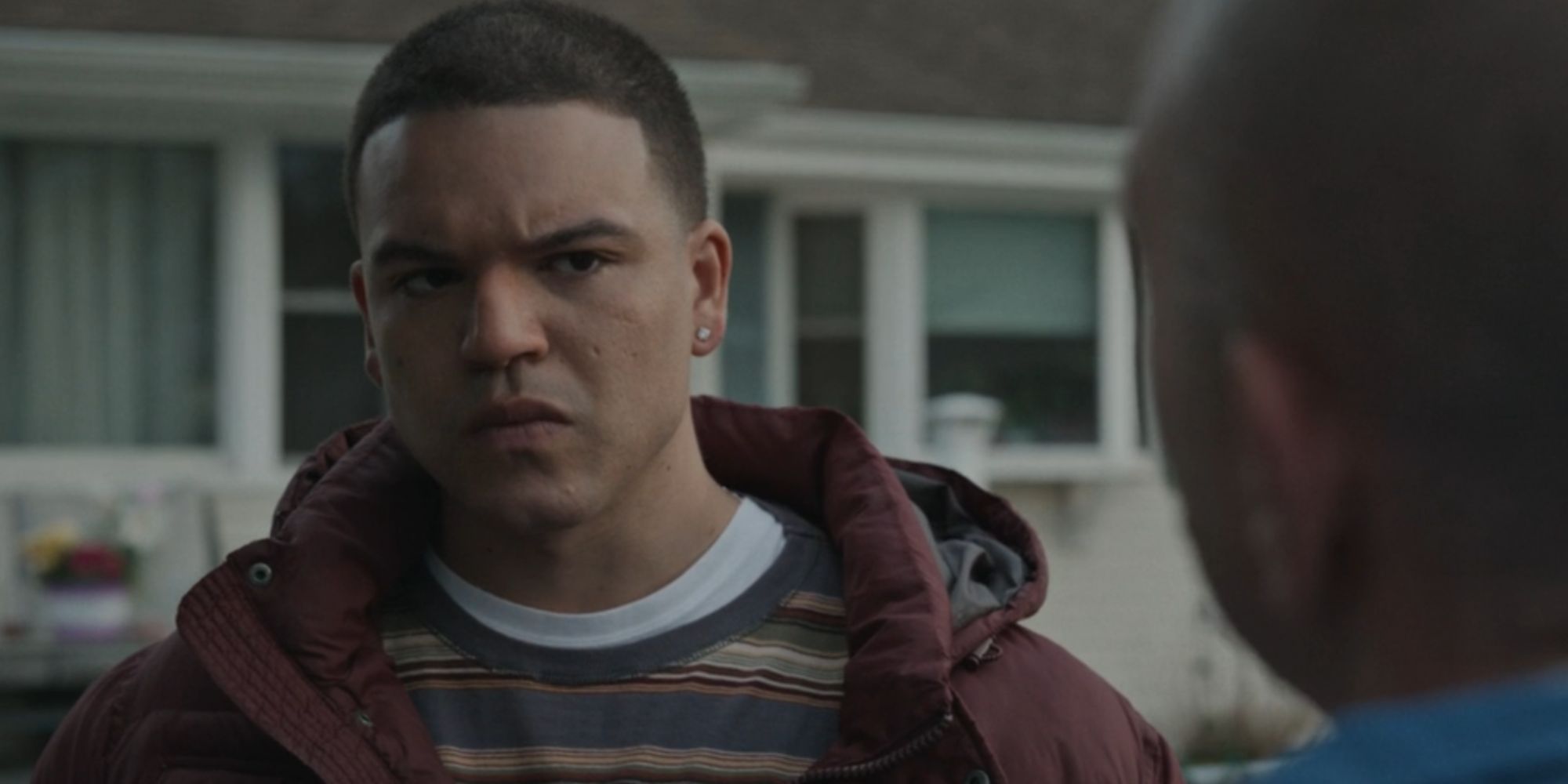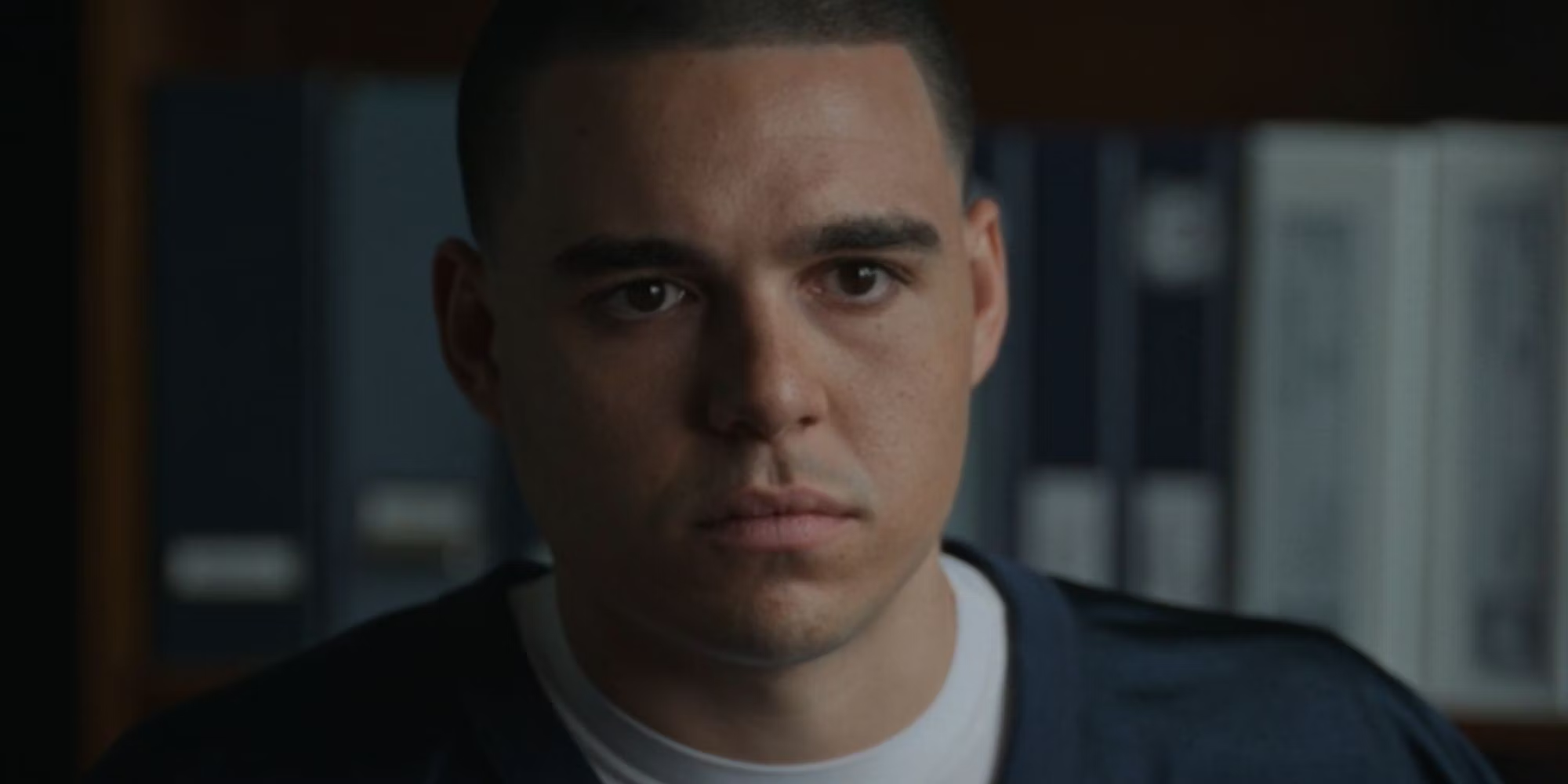American Sports Story: Aaron Hernandez is executive produced by Ryan Murphy and based on The Boston Globe and Wondery’s Gladiator podcast. The 10-episode limited series airs Tuesdays at 10 p.m. ET on FX, with the finale dropping November 12. While certain aspects have been dramatized for television, the first season of American Sports Story depicts the rise and fall of real-life NFL player, Aaron Hernandez. Hernandez was sentenced to life in prison for the murder of Odin Lloyd and was found dead in his cell in 2017.
Thomas Sadoski portrays Hernandez’ agent, Brian Murphy, who coaches the rising star through the extensive behind-the-scenes process of the NFL Draft. Sadoski is known for starring in The Newsroom, Life in Pieces, and John Wick. Lilly and The Crowded Room are two of his most recent projects. The actor shares that he is proud to be a part of American Sports Story and hopes that the series will help call out those in the industry who sacrifice young players for financial gain.
Related
American Sports Story Aaron Hernandez Soundtrack Guide: Every Song And When They Play
FX’s new series American Sports Story features a robust and relevant soundtrack full of 2000s hip-hop classics and collegiate fight songs.
Screen Rant interviews Sadoski about portraying the real-life agent, Murphy’s paternal affection for Hernandez, and how he hopes American Sports Story helps move the needle.
Sadoski Followed The Hernandez Case In Real-Time
“This is an indictment of the way that young men are sacrificed on the altar of financial gain for universities and for professional sports programs.”
Screen Rant: This limited series is based on a very harrowing true story. How much did you know about Aaron Hernandez before you booked this role?
Thomas Sadoski: Oh, a lot. I had followed it in real-time. I was a big fan of the Gladiator podcast. I’m also just a huge fan of the Boston Globe as an organization. I feel like they have a track record of doing some really first-rate and important work that’s stretched back, frankly, generations.
It was definitely something that I was excited to be a part of because of the affiliation with those folks. I feel like anytime that you can get into the orbit of working with people who are among the best in their field, which I feel like a lot of those reporters at the Boston Globe are, you’re in the right spot.
With a story like this, what was important to you, as an actor, about how it was told?
Thomas Sadoski: I love that Stu and Ryan were really clear about the fact that they didn’t want to pull any punches. In many ways, this is an indictment of the way that young men are sacrificed on the altar of financial gain for universities and for professional sports programs. That was something that I thought was an important story to tell.
As time has gone on in the last few years and things have changed in that industry, and it’s crazy that it’s an industry, but it is, it’s an industry, I’ve been very happy to see a lot of that stuff changing, but it was far too late in coming and too many people suffered because of it. I think that there needs to be a reckoning, and I’m very happy to be part of a show that is taking a step out in terms of that reckoning and starting to put that on the table.
Brian Murphy was a real person, so did that knowledge ever influence your performance?
Thomas Sadoski: Yeah, it does. It’s a tricky thing to play people, and I’ve done it a number of times now, who are currently living or have lived. You want to be very respectful to the reality of the fact that they’re human beings. I haven’t had to play a sociopath or a psychopath where the depth of their humanity comes into question. So you want to be very, very mindful of the fact that you’re playing a human being who is certainly, in this case, somebody who has a family and is walking and living and breathing out there.
And so digging into the court transcripts and watching as much as I possibly could and doing as much research as I possibly could on the guy to get a sense of what role he played in this whole thing, and then to be able to bring that to bear in the humanity of the person was something that was really important to me. I never want, as an artist, to be a cardboard cutout, and particularly in this role, I think that Brian did the best that he possibly could with the tools that he was given.
Unfortunately, he didn’t have all the information. He didn’t have all the information because he wasn’t given all the information by the person who was responsible for giving him all the information, or the people that were responsible for giving him all the information. But he really put himself out there to do the best that he possibly could for a very troubled young man. I have a lot of respect for what he tried to do to the best of his ability, and I wanted that to come through.
Sadoski Feels Brian Murphy Would’ve Had A Greater Impact On Aaron If They Had Met Earlier
“He seemed to be, on some level, an outlier in terms of how he was treating this kid and what he wanted for this kid.”
Why do you think Brian was so determined to have Aaron as a client? Is it as simple as him being a fantastic player, or was there something else there too?
Thomas Sadoski: The sense that I get is that Brian knew that this was a truly extraordinary athlete that he was dealing with. Aaron Hernandez was very special, even in NFL terms. I think that there was something paternal in Brian Murphy that saw that if this kid could be given the right guidance, the right opportunities, and be treated with care and respect, that he could blossom into, not only a really generational talent in terms of being an athlete, but that he had the capacity to be a good young man and to grow into a good man. I think that really inspired him to want to get in on this. That’s my sense of it anyway, and I wanted to respect that. I felt like I found that in some of the research that I did.
There was a real trust that felt like it could build between the two of them in Episode 4. What can you share about creating that dynamic with Josh Rivera?
Thomas Sadoski: The unfortunate reality is that I think that if Brian Murphy had had the opportunity to meet Aaron Hernandez even five years earlier, that the degree of trust that they could have built would’ve been something that could have changed the course of, not only that young man’s life, but also the lives of the innocent people who ended up being murdered.
And not to say that Brian Murphy is solely responsible for the salvation of Aaron Hernandez, he certainly wouldn’t have been and couldn’t have been, but he seemed to be, on some level, an outlier in terms of how he was treating this kid and what he wanted for this kid. In terms of how Josh and I made that happen on screen, you have to trust your partners when you’re going into these circumstances. Josh is a really talented, really great, really smart actor, and I certainly didn’t have any issue trusting that about him, and it’s my hope that he didn’t have any issue trusting that about me.
You sort of figure it out right from the jump from the first rehearsal, you look at each other, and you throw something at each other, and you go, “Alright, you know what? That person is listening to me. They’re catching it and throwing it back, and we are in sync in some way.” And once that’s established, you start playing, and it just grows and it grows quickly. So that was my experience with Josh. Here was an actor who was willing to take leaps, and he knew that I was going to catch him when he did and vice versa. It was a cool process.
The series really showcases the vigorous process of the NFL draft. Can you talk a bit about the mental and emotional requirements that Brian tried to prepare Aaron for?
Thomas Sadoski: It is not something that I think a lot of people have a clear understanding of in terms of how these young men are evaluated and how off-putting it all feels when you really dig into it. I think that working with somebody who is also not prepared for it or unaware of what exactly it’s going to entail requires a lot of work and can be very frustrating. I think that it takes a very specific person to want to put in that work and to be honest with somebody. “Look man, the issue with you is never going to be your playmaking ability.
“The issue with you is going to be that these people don’t trust you, but I see a good young man in you. We just have to insulate and protect that.” I don’t think that there were a lot of people who were saying that, certainly not to Aaron Hernandez, but probably not in this whole process. They weren’t saying it and actually meaning it. And my impression is that Brian Murphy was somebody who actually meant it when he said it. And again, he’s doing the best that he possibly could with the tools that he was given.
The reality is that, at a certain point, Aaron Hernandez was an adult, and he made the choices that he made to not be honest and not be fully open and not fully trust and not fully give himself over to protecting the best parts of himself. Some of that had to do with the fact that he had been absolutely completely betrayed throughout the course of his life by adult men who were supposed to be looking out for his best interest and they just never were. They were just taking advantage of him constantly. I think that there was a degree in which it was understandable that he wouldn’t completely trust somebody.
Sadoski Hopes American Sports Story Will Force Those Involved To Be Held Accountable
“There’s got to be a way in which people are looking back and saying, ‘This was absolutely unacceptable behavior.'”
Aaron’s brother also came to Brian for help. Do you think he brushed him off, or he really thought D.J. had a future as a coach instead of as a player?
Thomas Sadoski: I think that’s accurate. It didn’t feel like somebody who is giving off lip service. I don’t think that you put yourself out there, you don’t make those sort of leaps for somebody if you don’t actually believe it, particularly not when you’re super busy dealing with professional athletes and all of that sort of stuff.
He didn’t need to get D.J. a job in order to keep Aaron Hernandez as a client. I think that what Brian was willing to do in order to see these young men and to try to help them. I mean, what’s happened with D.J. in the last year or so, I feel like something horrible happened with him in terms of violence. But I think that, again, here was a guy who was trying to do his best to help these guys, and you can only do what you can do.
You touched on this a little bit earlier, but after the series finishes airing, are you hoping that there is a takeaway about either Aaron Hernandez or the sports industry? Or do you want this to serve as a strictly informative piece of work?
Thomas Sadoski: No, I think that in any piece of work that you want to do, you want it to have some sort of legacy of having moved the needle. And the thing that I want to always be conscientious of, particularly when you’re dealing with these sorts of situations, is that there were innocent people whose lives were lost, whose lives were valuable, people who were loved and had great value in the world, and their lives were lost for no good reason because of the actions of Aaron Hernandez. It’s important for me to keep that centered.
Also, I think it’s important that there needs to be a reckoning, not just in the industry and the way that things are handled and the way that this industry is discussed, but specific people need to be held to account. It’s my hope that, through the lens of this, people can start seeing that some of these coaches, particularly these college football coaches and athletic directors and administrators and the way that they go about making extraordinary amounts of money or did make extraordinary amounts of money off of the backs of this free labor that they were getting from these young men and sacrificing them in the process is something that needs to constantly be called out, not just as it’s happening now, but retroactively.
There’s got to be a way in which people are looking back and saying, “This was absolutely unacceptable behavior, and these people need to be, if not held accountable legally in some way, at least held accountable in the court of public opinion.” I’ve said it from the jump in terms of this thing. Urban Meyer was the coach of Florida at the time that Aaron Hernandez and the Pouncey brothers were down there, and I don’t give a d*mn what any of the people who played for him have to say about it. I think that that guy shouldn’t be allowed within a country mile of working with young men.
He’s the most reprehensible kind of character. The “Saturday Night Sinner, Sunday Morning Saint.” I find that kind of person to be exactly the kind of person who needs to be held up as the prime example of what went wrong. Not only in the industry, but in the specific situation that led to some innocent people losing their lives, and a young man, who had so much potential being turned into something—I don’t think any human being is born into this world evil. I think that the people who are responsible for taking advantage of those young men need to be held responsible.
About American Sports Story: Aaron Hernandez
Produced by 20th Television
The first installment of FX’s American Sports Story is based on the podcast Gladiator: Aaron Hernandez and Football Inc. from The Boston Globe and Wondery. The 10-episode limited series charts the rise and fall of NFL superstar Aaron Hernandez and explores the disparate strands of his identity, his family, his career, his suicide and their legacy in sports and American culture.
Check out our American Sports Story interview with Jaylen Barron as well.
American Sports Story: Aaron Hernandez airs on Tuesdays at 10 p.m. ET on FX.

American Sports Story is a TV show from Stu Zicherman and executive produced by Ryan Murphy. The series stars Josh Andrés Rivera as Aaron Hernandez and Patrick Schwarzenegger as Tim Tebow. The sports anthology series serves as the fourth installment in Murphy’s “American Story” franchise.
- Cast
- Josh Andrés Rivera , Patrick Schwarzenegger
- Seasons
- 1
- Directors
- Paris Barclay , Carl Franklin








